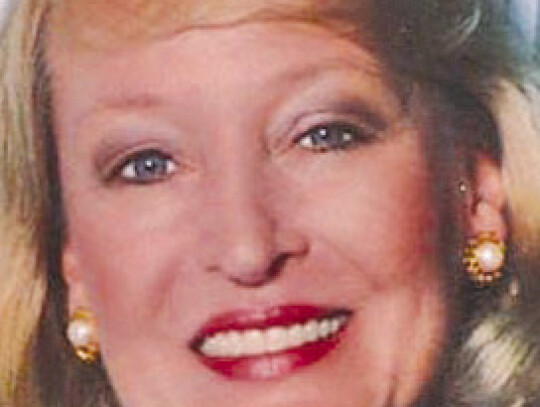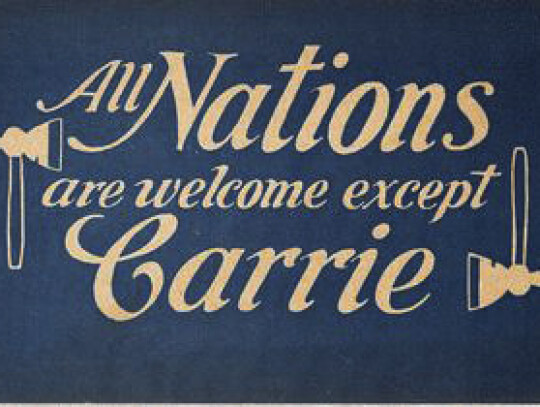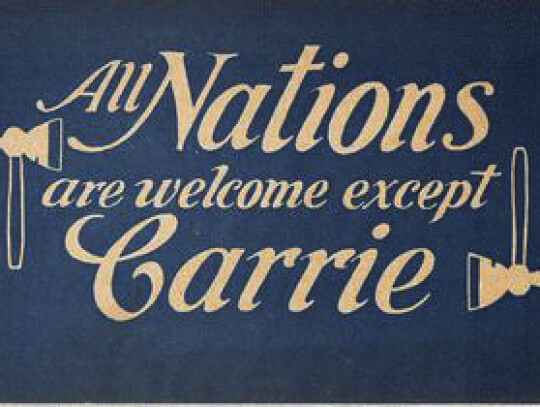Eagle Lake Remembers
She carried a hatchet and a Bible. At six-feet tall her presence was unmistakable. A mid-western woman of determination, she made history. She was Carrie Nation (1846-1911). Carrie and her lawyer husband were Eagle Lake’s neighbors. They bought 1700 acres along the San Bernard River living in Columbia and Richmond where Carrie ran a hotel and taught religious classes.
Carrie Nation became the most famous prohibitionist in the country in the late 1880s, wielding her Bible and her hatchet to destroy the alcohol- selling saloons and bars across the nation. She left her hatchet marks everywhere, including the Menger Hotel Bar in San Antonio where Teddy Roosevelt recruited his Rough Riders for fighting in Cuba. One slash mark still remains on the bar which was all but destroyed by Carrie’s weapons, her hatchet and Bible.
Saloons, once a symbol of the West, were not unknown to Eagle Lake during the early days of the first train whistles through Eagle Lake and Colorado County. In the mid to late 1800s, the dusty wagon main streets of our small local county towns lay in the shadow of tall saloons with their boardwalk fronts.
Aproned bartenders served up brew to railroad workers, cattle drovers, farmers, business-owners, and passers-by.
Saloons were places for men. Eagle Lake’s main street had several saloons, which were successful money-making establishments where men would gather for conversation, news, business, weather updates, and alcohol. Columbus, Garwood, and even the smallest area towns had their saloons, and subsequent challenges. Alcohol ran freely, and side-arms were plentiful. Carrying a pistol was common in those days, until a 50% tax was imposed on firearms in 1907, which lessened their use.
The Beckmann-Brosig Saloon, once called the Buckhorn, along with the Wellford Saloon, was a popular location in Eagle Lake. In Garwood, the SunRise and the SunSet Saloons were frequented. In Columbus, the Henry Ilse and Brunson Saloons were among many county drinking establishments. Handguns, alcohol, gambling, and disagreements spelled trouble in Eagle Lake, Columbus and other nearby Texas towns.
Agitations, fights, and shootings often disrupted towns and families. Eagle Lake City Marshal W.B. Kinnard was shot and killed on Main Street in 1903. Near Lissie and New Philadelphia cattle drives were frequent. The saloon was a popular stop for the cattle drovers. Nearby, the old unmarked Boot Hill Cemetery at Lissie on the Mose Thomas land near the railroad track was the final resting place for itinerant pistol-packing cowboys whose names were never even known.
Rumblings for alcohol prohibition and safer, more peaceful towns were started by women, churches, and some few elected officials. After the Civil War, millions of immigrants came to Texas and other parts of the country bringing their customs. The brewing business began to thrive, led by German-American entrepreneurs. Breweries added to alcohol availability, and even louder cries for alcohol prohibition were heard by distraught wives and mothers.
The first anti-alcohol movement swept the nation in the 1830s and 1840’s with the temperance movement. Alcohol abuse by men over age 15 had become excessive, affecting their families, their work, and their towns. Prohibition was still in the shadows until the late 1800s The strongest advocate for alcohol prohibition was finding her voice. Carrie Nation said, “My business is to fight, not to sit in a rocking chair; and I am fighting a good fight. I am here to destroy the works of the devil. No one will deny the saloon is the work of the devil!”
The six-foot tall Carrie Nation became the loudest female prohibition voice of the country, raging against the use of alcohol and its effects upon families. She took her wrath into saloons, breaking up bottles and bars, shouting the ills of bartending as well as drinking. Her zeal was irrepressible. She became a national icon for the elimination of saloons, alcohol, drunkenness, and violence. She traveled through Eagle Lake often by train in full view of the Main Street saloons.
Carrie’s first husband was an alcoholic, leaving devastating effects upon her life and family, creating her zeal for alcohol reform. The family remained in Texas until 1889, when, due to Texas politics, her husband moved them back north to Kansas.
Carrie Nation rode the rails through Eagle Lake to all parts of Texas, as she spoke against alcohol across Texas and later the nation. She became famous for her “hatchetations,” as she called them. She carried a hatchet or an ax beneath her black cloak as she entered an establishment to wreak destruction. At a New York bar a sign read, “All Nations Welcome, except Carrie.”
Between 1900 and 1910 she was arrested 30 times, paying her fines, and continuing her journey to “save men from a drunkard’s fate,” until her death in 1911. Her tombstone in Missouri reads, “Faithful to the Cause of Prohibition. She hath done what she could.
On January 17, 1920 the 18th Amendment for Prohibition went into effect to create a ‘dry’ America. It was a bold effort, but immediately saw illegal rise of ‘speakeasies,’ stills, gambling houses, and liquor dispensaries. City Marshals were elected to maintain law and order, and Texas Rangers were called in to assist in law enforcement. Eagle Lake Rangers Joseph Osaba, Thomas Heard, and Capt. Wheatley assisted in law-keeping efforts. The Amendment was repealed in 1933.
Carrie Nation made her mark on US history.
.jpg)



